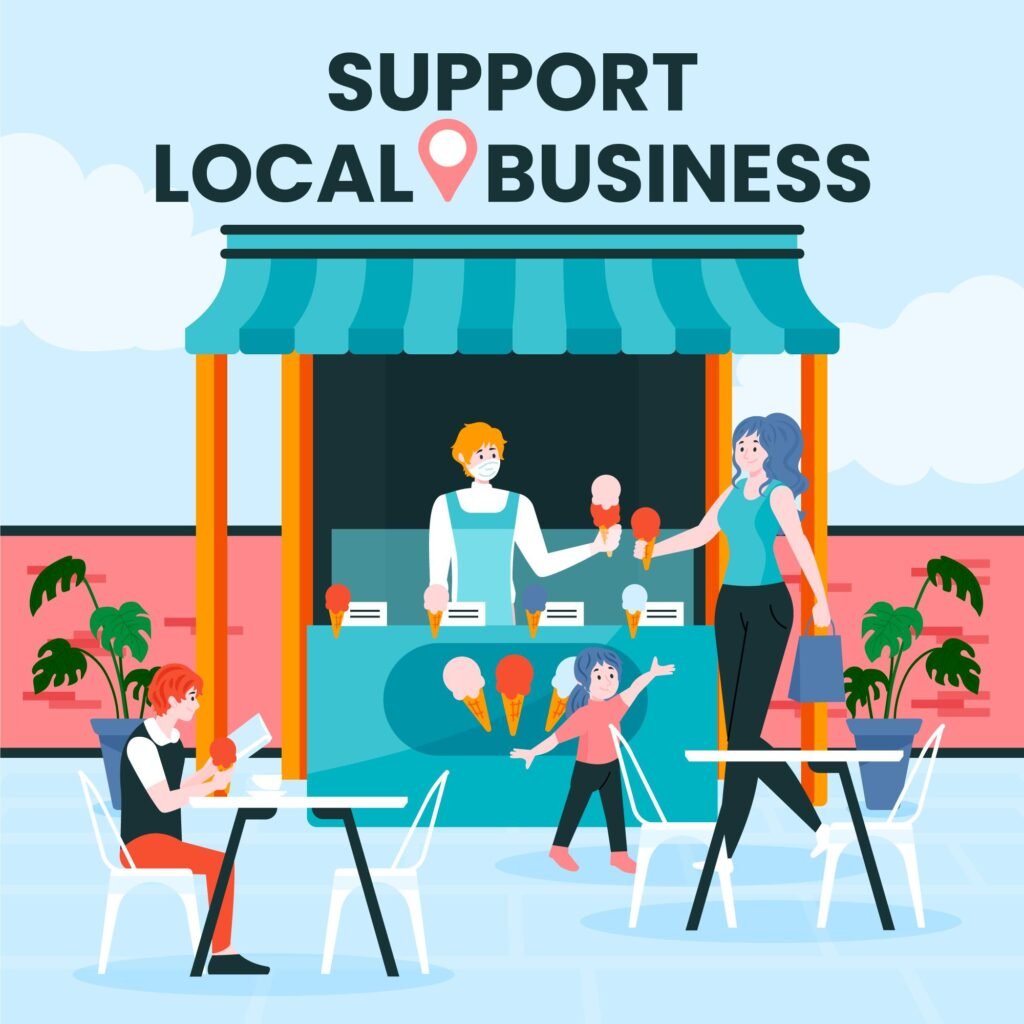Small businesses are more than just shops and services—they are the lifeblood of local communities across the United States. From the neighborhood coffee shop that knows your order by heart to the family-run boutique that carries unique, handcrafted products, these enterprises create jobs, foster innovation, and bring people together. Yet, sustaining and scaling these businesses has never been more challenging.
The good news? Local support is fueling small business growth in ways we’ve never seen before. Communities are rallying behind their entrepreneurs, local governments are offering resources, and digital tools are leveling the playing field. Consumers, too, are increasingly conscious of their spending, choosing to support small businesses that keep money circulating within the community.
At the same time, technology platforms like Confe.io are giving small businesses a competitive edge. Managing social media, content, and customer engagement can feel overwhelming for local entrepreneurs, but Confe.io makes it seamless. By helping businesses create content effortlessly, schedule posts, and collaborate with their teams—all in one place—it allows owners to focus on what truly matters: serving their community and growing their business.
Why Small Business Growth Matters in the US
The Backbone of the Economy
Small businesses account for nearly half of private sector employment in the US. They generate jobs, stimulate innovation, and keep money circulating within communities. Small business growth isn’t just about economic expansion—it’s about building sustainable, resilient neighborhoods.
Community Identity and Culture
Unlike big-box retailers, local businesses add unique character to towns and cities. They represent cultural diversity, heritage, and personal service that larger corporations often lack. When local residents rally behind these businesses, they help preserve their community’s identity.
How Local Support Is Fueling Small Business Growth
1. Consumer Loyalty and Conscious Spending
One of the strongest drivers of small business growth is the rising awareness among consumers. Shoppers are increasingly prioritizing sustainability, quality, and personalized service over convenience. Movements like “Shop Local” and “Small Business Saturday” have made significant impacts, generating billions in revenue for local businesses.
2. Community Initiatives and Grassroots Movements
Neighborhood groups, chambers of commerce, and community development organizations often launch campaigns to boost local businesses. Farmers’ markets, local festivals, and pop-up shops create visibility while encouraging residents to support entrepreneurs in their area.
3. Local Government Support
Many local governments provide tax incentives, grants, and training programs to encourage entrepreneurship. Initiatives like low-interest loans and business incubators help startups overcome the initial financial hurdles that often hinder small business growth.
4. Collaboration Between Businesses
Networking events and partnerships allow small businesses to collaborate instead of compete. For example, a coffee shop might partner with a local bakery, or a boutique clothing store may team up with a nearby artisan jewelry maker. These collaborations strengthen community ties while driving mutual growth.
5. Technology and Digital Presence
With the rise of digital platforms, local businesses can now reach wider audiences. Websites, social media, and local SEO strategies help them compete with national brands. Even small businesses in rural areas can now access customers nationwide, fueling growth in unexpected ways.

Leveraging Digital Tools Like Confe.io for Small Business Growth
In today’s fast-paced digital world, small businesses cannot rely solely on walk-in customers or word of mouth. To thrive and sustain small business growth, they need effective online visibility, consistent content creation, and seamless collaboration with their teams. This is where platforms like Confe.io come into play.
Why Confe.io Matters for Small Businesses
Confe.io is designed to save business owners valuable time by simplifying the way they manage social media and content marketing. Instead of juggling multiple tools or struggling with inconsistent posting, Confe.io provides an all-in-one solution that drives efficiency and growth.
Key Benefits of Confe.io for Small Business Growth
Effortless Content Creation: With AI-powered tools, businesses can generate engaging posts tailored to their brand voice.
Centralized Collaboration: Teams can securely collaborate, plan, and approve content from one easy-to-use platform.
Time-Saving Scheduling: Confe.io allows businesses to schedule posts across multiple channels with a single click.
Streamlined Approvals: A built-in calendar and approval system ensure smoother workflows and reduced miscommunication.
Enhanced Visibility: By maintaining a consistent and professional presence online, small businesses can attract new customers and strengthen community ties.
Real-World Impact
For many local businesses, time and resources are limited. By using a platform like Confe.io, entrepreneurs can focus more on serving their community while still maintaining a strong digital presence. This balance of offline and online support is key to long-term small business growth in the US.
The Role of Funding and Investment
Access to Capital
Funding remains a major challenge for small businesses. Traditional banks often hesitate to lend to startups with limited history. However, community banks and credit unions play a pivotal role by offering flexible lending options to local entrepreneurs.
Crowdfunding and Community Investment
Platforms like Kickstarter and GoFundMe have allowed small businesses to raise money directly from their communities. These funding models not only provide capital but also foster loyalty, as contributors become emotionally invested in the success of the business.
Public-Private Partnerships
Public agencies collaborating with private organizations have introduced innovative funding mechanisms. By pooling resources, they reduce risks for individual investors while creating a strong foundation for small business growth.
Challenges Faced by Small Businesses
Rising Costs
Rent, utilities, and labor costs are increasing, making it harder for small businesses to maintain profitability.
Competition from Big Corporations
Large retailers and e-commerce giants still pose a threat due to their scale and pricing power.
Lack of Digital Knowledge
Although technology is a growth enabler, many small business owners struggle with digital marketing, e-commerce platforms, and analytics.
Regulatory Hurdles
Permits, zoning laws, and compliance requirements can slow down operations, especially for first-time entrepreneurs.
How Small Businesses Can Use Local Support
Strengthening Community Connections
Small businesses can participate in local events, sponsor neighborhood activities, and engage directly with their customer base.
Adopting Digital Tools
From e-commerce websites to social media ads, digital marketing expands reach and strengthens relationships with local customers.
Building Partnerships
Collaborating with other small businesses can create bundled offers, joint marketing campaigns, and cross-promotions.
Advocating for Policy Support
Joining local chambers of commerce or trade organizations allows businesses to have a stronger voice in policymaking.
The Future of Small Business Growth in the US
The shift toward local support shows no signs of slowing down. With growing awareness of sustainability, inclusivity, and innovation, small business growth will remain a priority for both consumers and policymakers. Advancements in technology, combined with strong community backing, are creating fertile ground for entrepreneurship in America.
FAQs
Q1: Why is local support important for small business growth?
Local support helps businesses generate revenue, create jobs, and strengthen community identity.
Q2: How does technology contribute to small business growth?
Technology enables businesses to expand their reach, improve operations, and compete with larger corporations.
Q3: What role do local governments play in small business growth?
Local governments provide grants, loans, tax incentives, and training programs that help entrepreneurs succeed.
Q4: Can small businesses survive against large corporations?
Yes, by offering personalized services, unique products, and community engagement, small businesses can thrive.
Q5: How do community events impact small business growth?
Community events increase visibility, attract customers, and foster stronger relationships between businesses and residents.
Conclusion
Local support has become the cornerstone of small business growth in the US. From consumer choices to government policies and technological innovations, every layer of support contributes to building stronger, more resilient communities.
As Americans continue to value authenticity, sustainability, and local culture, small businesses stand poised for continued success. By embracing collaboration, digital tools, and community-driven strategies, small businesses can not only survive but thrive in today’s competitive marketplace.
The future of small business growth lies in the power of local support—one purchase, one partnership, and one community at a time.













